2017 Events
- Spring 2017
Conference on Cuban novelist Leonardo Padura
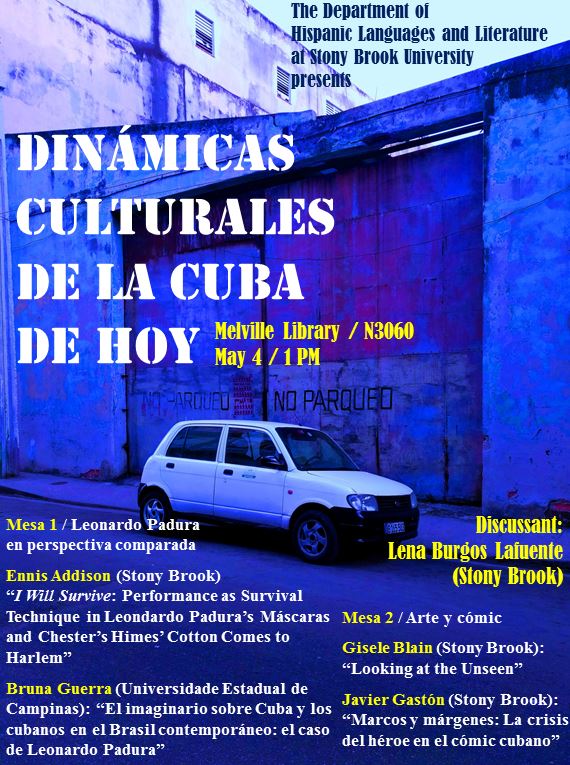
Conference on Cuban novelist Leonardo Padura
Our graduate students and visiting fellow discuss Cuban novelist Leonardo Padura, moderated by Prof. Lena Burgos Lafuente. May 4, 2017 in Melville LIbrary N3060.
Round Table: Populismos en España y Latinoamérica
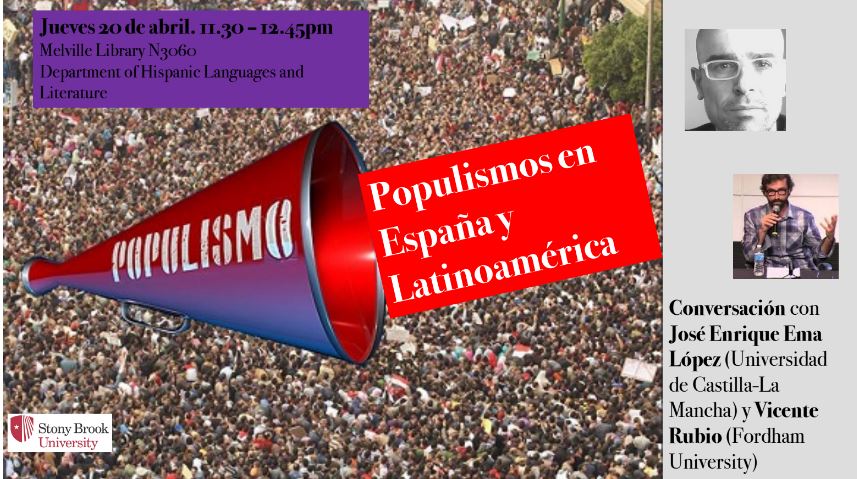
Round Table: Populismos en España y Latinoamérica
José Enrique Ema López (Univ. de Castilla-La Mancha) y Vicente Rubio (Fordham Univ)
Thursday April 20th, 11.30 am to 12. 45 pm, Melville Library N3060Conference by Equatorial Guinean-Spanish writer and journalist Donato Ndongo Biyogo
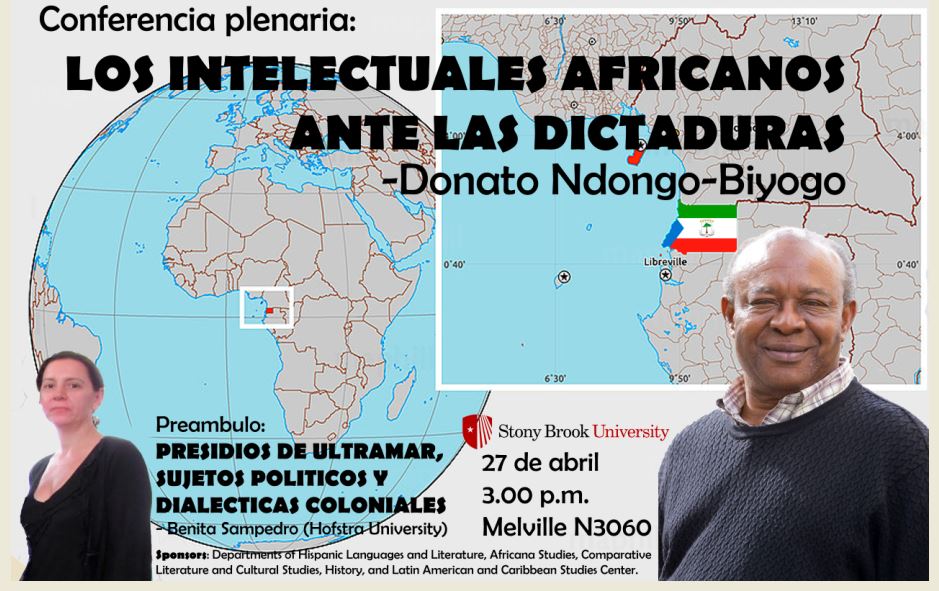
Conference by Equatorial Guinean-Spanish writer and journalist Donato Ndongo Biyogo
Introduction by Prof. Benita Sampedro (Hofstra Univ.)
April 27, 3 pm in Melville Library N3060. Free and open to the public.Talk by Prof. Adrián Pérez-Melgosa
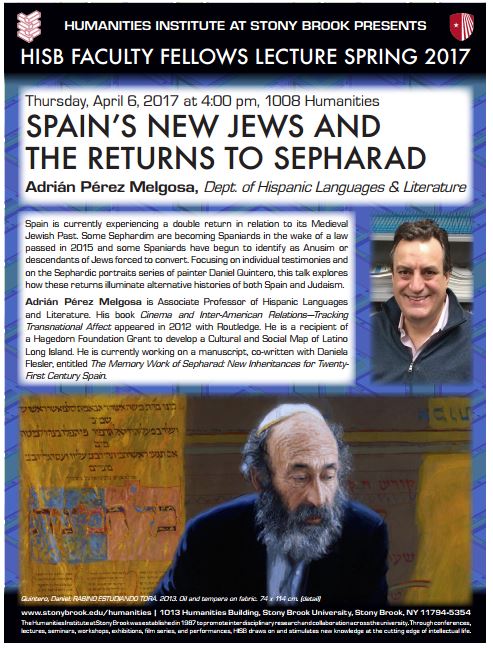
Talk by Prof. Adrián Pérez-Melgosa
"Spain’s New Jews and the Returns to Sepharad". April 6, 2017, Humanities Institute
Talk by Prof. José Enrique Ema (Univ Castilla-La Mancha)
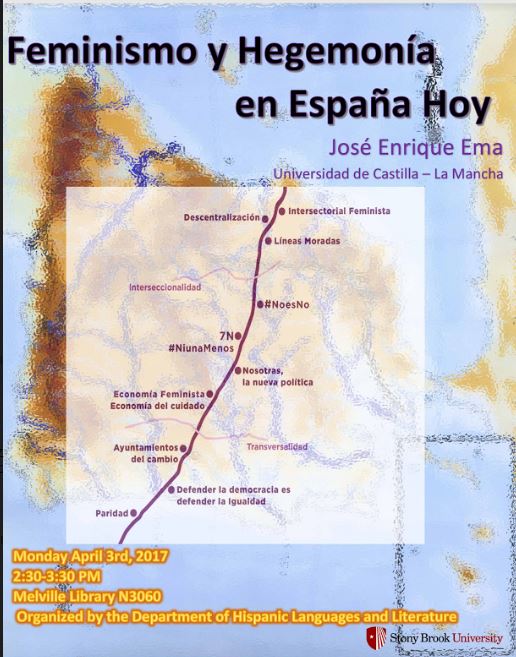
Talk by Prof. José Enrique Ema (Univ Castilla-La Mancha)
Monday April 3rd, from 2:30 to 3:30 pm in Melville Lib N3060
FESTIVAL DE CINE HISPANOAMERICANO “CUBA: FROM UTOPIA TO DYSTOPIA”
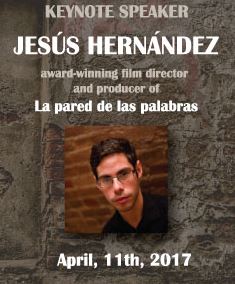
FESTIVAL DE CINE HISPANOAMERICANO “CUBA: FROM UTOPIA TO DYSTOPIA”
The eighth Annual Hispanic Film Festival at Stony Brook will for the first time offer a selection of films devoted to a single nation, Cuba, with a focus on recent independent cinema produced on the island.
“It seemed appropriate to dedicate this year’s festival to Cuban films, in view of the dramatic changes occurring in US-Cuban relations and in the country more generally,” states graduate student Gisele Blain de Dios, the chief organizer of the event. “Our goal is to promote a group of outstanding recent films and contribute to an awareness of the diversity of Latin American culture and cinema.”
The festival will take place on April 10, 11, 18 & 20 with one film screened each evening at 7:00 pm on the Stony Brook campus in Humanities 1006. The four films were directed over the last four years by filmmakers from different generations working with a variety of aesthetic approaches.
El acompañante/The Companion (Pavel Giroud), April 10
La pared de las palabras/The Wall of Words (Fernando Pérez), April 11
Conducta/ Behavior (Ernesto Daranas), April 18
Esteban (Jonal Cosculluela), April 20
The Stony Brook University Hispanic Film Festival is free and open to the public.Tertulia Literaria. Spanish Poetry Reading: Wed April 19, 1-2.20 pm in our Dept Lounge
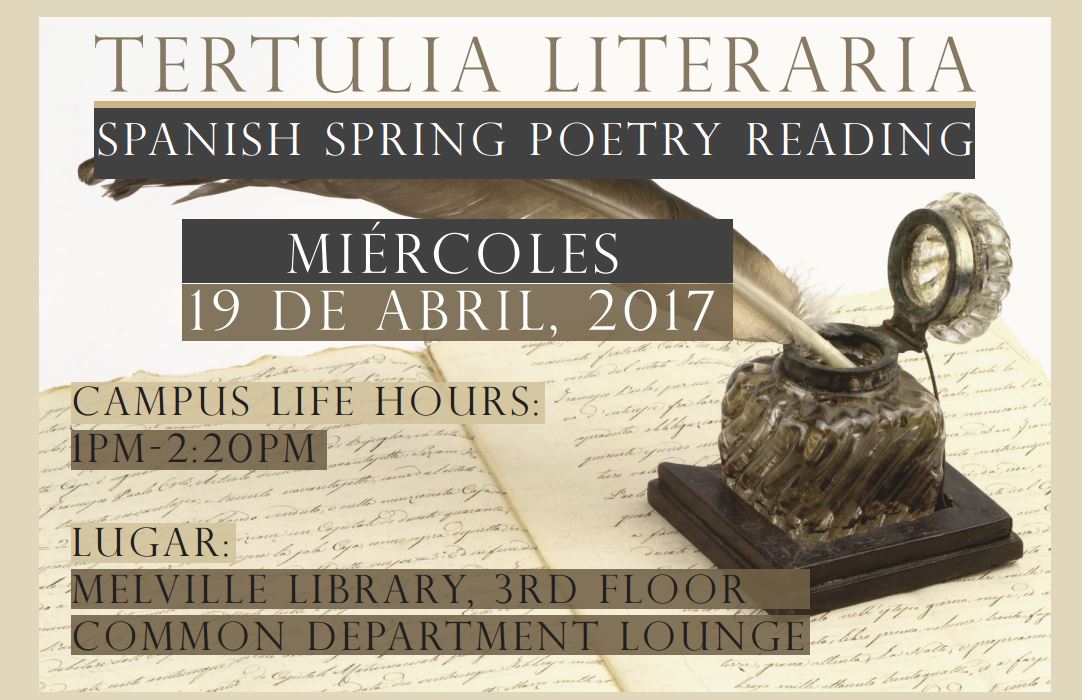
Grupo de lectura con la prof. Aurélie Vialette
Conversation with judge Blanca Rodriguez-Velasco (Seminar with Prof. Aurélie Vialette)
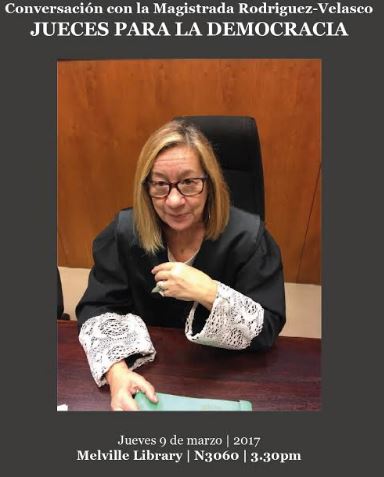
Conversation with judge Blanca Rodriguez-Velasco (Seminar with Prof. Aurélie Vialette)
More information on Jueces por la democracia
Talk: Fábio Feltrin de Souza (Universidade Federal da Fronteira Sul)
Talk: Fábio Feltrin de Souza (Universidade Federal da Fronteira Sul)
“La invención del desierto en Argentina”
Wednesday – February 22 – 2:30 – 3:50 - Melville Library W4530
Resumen: Esta presentación se propone examinar cómo el concepto de “desierto” fue creado en el siglo XIX argentino como una representación de ausencia, barbarie, vacío y, como resultado, constituyó un argumento legitimador del proyecto de exterminio de comunidades indígenas por parte del Estado. La producción discursiva del desierto puede adoptar dos dimensiones: primero, comprende el espacio como particularmente variable; segundo, esta metáfora espacial está atravesada por metáforas y analogías y es el resultado de la producción de imágenes y comparaciones. Nociones como la de desierto, por ejemplo, no se refieren a un lugar concreto o natural, geográficamente definido, sino más bien a un tipo de experiencia social, cultural y económica.
Fábio Feltrin es professor de historia latinoamericana en la Universidade Federal da Fronteira Sul (UFFS, Santa Catarina, Brasil), y realiza estudios posdoctorales en la Universidade Estadual de Campinas (Unicamp). Es Visiting Scholar en Stony Brook University, donde está trabajando en su proyecto “Modernidad, guerra y biopolítica: la transformación de las pampas argentinas en desierto en el siglo XIX”, que se concentra en la representación visual de esta región geográfica en diálogo con la guerra de exterminio del Estado contra las comunidades indígenas hacia fines del siglo.Workshop on Brazilian Literature: Adalberto Müller (Universidade Federal Fluminense, Brasil)
Workshop on Brazilian Literature: Adalberto Müller (Universidade Federal Fluminense, Brasil)
LITERATURA Y VIDA: RADUAN NASSAR Y CLARICE LISPECTOR
Friday Feb 24, 1-4 pm – Melville Library Room N3060
Descripción: ¿Qué sentidos puede tener pensar hoy el concepto bergsoniano de vida en la comprensión de textos literarios? Creo que es posible volver a ese ensayo clásico, "Consciencia y vida", añadiendo algunas consideraciones de Deleuze, para pensar cómo se entrelazan vida y lenguaje en la narrativa. Más que discutir la "vida literaria" (como lo hizo Flora Süssekind con la literatura brasileña de los años 70) me interesa pensar – tomando como ejemplo cuentos de Raduan Nassar y de Clarice Lispector – qué es eso que vive o que está vivo en esas obras literarias mientras las (re)leemos.
Bibliografia:
BERGSON, Henri. "Conscience et vie", in L'énergie spirituelle.
DELEUZE, Gilles. "Littérature et vie", in Critique et clinique.
LISPECTOR, Clarice. "Amor" y "O búfalo", in Laços de família.
NASSAR, Raduan. "Menina a caminho", in Menina a caminho (contos).
Adalberto Müller es Profesor de teoría literaria en la Universidad Federal Fluminense (UFF), Niterói-Rio de Janeiro. Fue Visiting Scholar en Yale University en 2013, y ha publicado sobre cine y literatura. En este momento está traduciendo la poesía de Emiliy Dickinson al portugués.Dafne Duchesne (New York University)
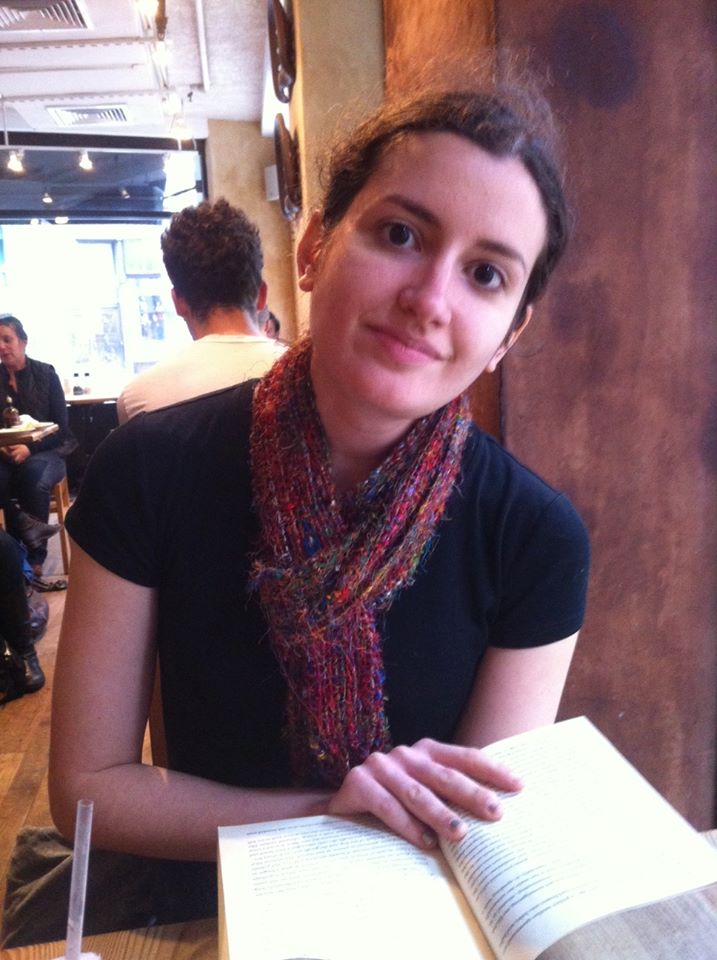
Dafne Duchesne (New York University)
"Two Contending Mothers: Discrepant Allegories in Emeric Bergeaud's Stella"
Thursday, March 2 11:30AM
Javits 103
Despite being considered the first Haitian novel, Émeric Bergeaud’s Stella (1859), has until recently been neglected or denied literary value by literary critics. Stella’s contribution to nineteenth century literature lies in the role of allegory in the novel and the absence of a national foundational myth. As a nineteenth century text, Stella raises questions of genre related to the genealogy between the creole story and the novel. As a representation of the Haitian Revolution of 1791, it portrays a conflicted approach to the legacy of the French Revolution and the Enlightenment. The articulation of the Haitian Revolution and the French is embodied in the characters of Stella, a white French lady exiled in Saint-Domingue, and Marie L’Africaine, a slave and the mother of the Haitian fictional heroes Romulus and Remus. Nevertheless, rather than becoming allegories of national cohesion, they produce a series of non-encounters that ultimately point to an emergent literary and historical sensibility that is distinctly Caribbean.Cafe Latino Film Series / Latin American Film Series
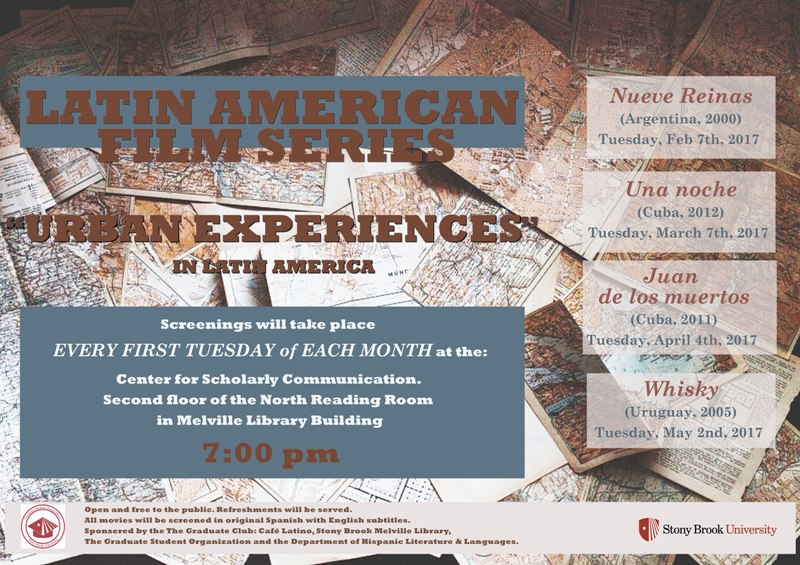
Cafe Latino Film Series / Latin American Film Series
Urban Experiences
Feb. 7, Nueve reinas (Argentina, 2000)
March 7, Una noche (Cuba, 2012)
April 4, Juan de los muertos (Cuba, 2011)
May, 2, Whisky (Uruguay, 2005)
Every first Tuesday of the month at 7 pm. At the Center for Scholarly Communications (Melville Library, second floor) - Fall 2017
Talk Prof. Nuno Manna (Federal Univ of Bahia)
Talk Prof. Nuno Manna (Federal Univ of Bahia)
Newspapers as Everyday Literature:
Intersections between Journalism and Literature
HUM 1008
1 pm to 2:20 pm
